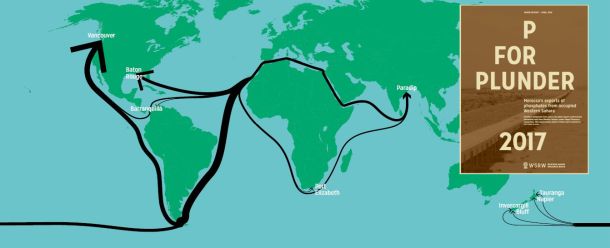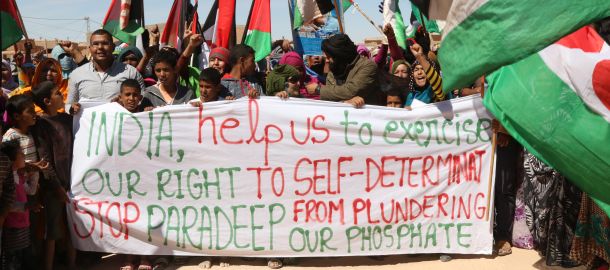Western Saharan activists are targeting Australia\'s reliance on their homeland\'s richest natural resource. The region and its phosphate reserves were illegally annexed by neighbouring Morocco in 1975 and activists have travelled to Australia to raise awareness about the continuing occupation. See 7:30 report on Australian Broadcasting Corporation, 9 June 2008 here.
Download the TV report on http://www.abc.net.au/7.30/content/2007/s2269397.htm
Transcript
KERRY O'BRIEN, PRESENTER: For more than a century, fertiliser derived from the mineral phosphate has played a crucial role in Australian agriculture. Because it's such a rich source of vital plant nutrients turning poor soil into rich green pastures, Australia has long been one of the world's biggest phosphate importers.
And most of the phosphate used on Australian farms is actually from one of the world's poorest and inhospitable regions, Western Sahara. Illegally annexed by neighbouring Morocco in 1975, Western Sahara is sometimes referred to as Africa's East Timor. Now Western Saharan activists are targeting Australia's reliance on their homeland's richest natural resource.
James Carleton reports.
EDGAR DOWNES, DAIRY FARMER: We're very proud of the milk we produce on this farm. It's of very high nutrition, and it can only come from cows that are well fed and healthy.
JAMES CARLETON, REPORTER: Here on this fifth generation dairy farm in the Southern Highlands of NSW, there's no shortage of feed, and apart from being relatively lucky with rain, Edgar Downes has no doubt about why.
EDGAR DOWNES: Here's the product here that we're putting on the paddock. It's superphosphate. The phosphate in it is actually only a small part of it. Only needs probably a couple of double handfuls on the area the size of a football field to do the job.
JAMES CARLETON: Phosphate is a rich source of phosphorous, one of the key nutrients vital to plant growth. When the phosphate rock is chemically treated it makes the rich superphosphate fertilisers that's seen these pastures grow thicker and faster than ever before.
EDGAR DOWNES: If we don't do it, then half of our production is gone.
JAMES CARLETON: But while the superphosphate used here and across the country helps achieve great things on Australian farms, it comes at a terrible price paid on the other side of the world.
MELAININ LAKHAL, WESTERN SAHARAWI REFUGEE: Please, look for alternatives. Please, there are other countries in the world that has got phosphate. Why don't you try and find alternatives and, you know, find other sources? And please understand that your activity in the territory is harmful to our people, too.
JAMES CARLETON: There are no green pastures where Melainin Lakhal lives. In 1975, Western Sahara on Africa's western coast was occupied by neighbouring Morocco. 33 years later, 100,000 people remain displaced. The sight of fertile ground, a distant memory.
MELAININ LAKHAL: The invasion was a military invasion, it was a very bloody invasion, especially from the north, from the Moroccan borders with Western Sahara. I was arrested many times, tortured and was disappeared for months, during this period.
JAMES CARLETON: Now, with help from a small but dedicated Australian support group, he's travelled here to tell his own story.
FRIEND: Well, how does this compare with the beaches in Western Sahara?
MELAININ LAKHAL: Well,, it's very similar. Beautiful. I'm here to raise awareness to Australians about the plight of my people about the cycle of freedom. But also, to raise their awareness about the fact that they are receiving, without knowing it, stolen goods from Western Sahara.
JAMES CARLETON: Melainin Lakhal says when Morocco invaded it didn't just take his people's land, but ownership of the country's natural resources as well.
1975 TV NEWS REPORT: In Morocco, plans are going ahead for the big march into the Spanish Sahara, the idea for Morocco to get control of the area's phosphate deposits before somebody else does. The United Nations has asked all parties to show restraint, but it sounds as though the big land rush is on anyway.
JAMES CARLETON: It's this message Melainin Lakhal is trying to send as widely as possible to government officials, farmers, trade unions, even school students, and it's a challenge given that unlike others in Africa, his is a conflict most have never heard of.
MELAININ LAKHAL: You have Western Sahara on your table every day, because this superphosphate is used in farming.
JAMES CARLETON: And it's been that way for more than 20 years. Three Australian companies Incitec Pivot, Impact and Wesfarmers buy the phosphate from Morocco and turn it into fertiliser for use on Australian farms.
MELAININ LAKHAL: The income of this exploitation of my country's natural resources is going to the occupying force. It is used against me and against the Saharan people. It is used to maintain a military occupation.
JAMES CARLETON: All three fertiliser companies declined to be interviewed by the 7.30 Report, but one agreed to meet Melainin Lakhal.
MELAININ LAKHAL: Well, I'm here to meet with Wesfarmers to clearly say to them that we oppose the exploitation of natural resources in Western Sahara.
JAMES CARLETON: But that meeting is unlikely to change the status quo, because even though phosphate rock is available from other parts of the world, including here in Australia, it doesn't come close to the quality or quantity found in Western Sahara.
JAMES CARLETON: Australia's fertiliser companies say it's a problem the international community has to solve. They say there's very little they can do. And that leaves farmers here with little choice but to use a product that generates such strong returns.
EDGAR DOWNES: My first responsibility is to the immediate environment of this farm and its viability, and, phosphate is an essential part of keeping this farm both environmentally and financially sustainable, and I don't think there's a lot I can do as a farmer in Australia about the political situation in the Western Sahara.
JAMES CARLETON: But the United Nations says there is something Morocco can do, and that's to finally deliver on its 16 year old promise to hold a referendum on self determination. So far the UN brokered negotiations on this issue have continued to stall, and Stephen Zunes, who's written a book on the subject, says it's unlikely to change, despite no one in the international community recognising Morocco's sovereignty over Western Sahara.
STEPHEN ZUNES, INTERNATIONAL STUDIES, SAN FRANCISCO UNIVERSITY: The primary problem is that Morocco, which is the occupying power of Western Sahara, has close friends on the United Nations' Security Council, specifically France, the United States which have used and threat of a veto power to prevent the UN from enforcing resolutions calling for Morocco's withdrawal or at least to have a free and fair referendum.
JAMES CARLETON: For its part, the Australian Government says it supports a referendum, but in the absence of formal UN sanctions, it will continue to trade in the Saharan phosphate, a stance that offers little comfort to the people of Western Sahara.
STEPHEN ZUNES: As long as Australia is willing to continue buying phosphates and in other ways, supporting the occupation economically, the words really won't go very far.
JAMES CARLETON: Melainin Lakhal says he wants the trade to continue, but with self determination resolved. He returns to the camps with a growing number of Australians now aware of his country's struggle for independence, and the hope that it won't be ignored for much longer.
KERRY O'BRIEN: James Carleton with that report.
New report: Western Sahara phosphate trade halved
The export of phosphate rock from occupied Western Sahara has never been lower than in 2019. This is revealed in the new WSRW report P for Plunder, published today.
New report on Western Sahara phosphate industry out now
Morocco shipped 1.93 million tonnes of phosphate out of occupied Western Sahara in 2018, worth an estimated $164 million, new report shows. Here is all you need to know about the volume, values, vessels and clients.
New report on contentious Western Sahara phosphate trade
Morocco shipped over 1.5 million tonnes of phosphate out of occupied Western Sahara in 2017, to the tune of over $142 million. But the number of international importers of the contentious conflict mineral is waning, WSRW's annual report shows.
New report on global phosphate trade from occupied Western Sahara
Over 200 million dollars worth of phosphate rock was shipped out of occupied Western Sahara last year, a new report from WSRW shows. For the first time, India is among the top importers.



